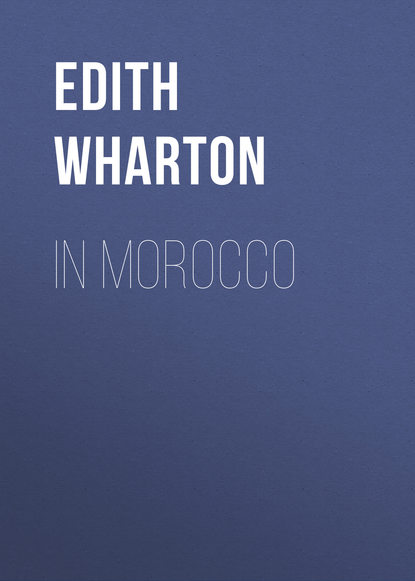По всем вопросам обращайтесь на: info@litportal.ru
(©) 2003-2024.
✖
In Morocco
Настройки чтения
Размер шрифта
Высота строк
Поля
This time it was to see a company of officers in brilliant uniforms advancing at a trot across the plain from Rabat. At sight of the figure that headed them, so slim, erect and young on his splendid chestnut, with a pale blue tunic barred by the wide orange ribbon of the Cherifian Order, salutes pealed forth again from the slope above the palace and the Black Guard presented arms. A moment later General Lyautey and his staff were riding in at the gates below us. On the threshold of the inner court they dismounted, and moving to the other side of our balcony we followed the next stage of the ceremony. The Sultan was still seated in the audience chamber. The court officials still stood drawn up in a snow-white line against the snow-white walls. The great dignitaries advanced across the tiles to greet the General; then they fell aside, and he went forward alone, followed at a little distance by his staff. A third of the way across the court he paused, in accordance with the Moroccan court ceremonial, and bowed in the direction of the arcaded room; a few steps farther he bowed again, and a third time on the threshold of the room. Then French uniforms and Moroccan draperies closed in about him, and all vanished into the shadows of the audience hall.
Our audience too seemed to be over. We had exhausted the limited small talk of the harem, had learned from the young beauties that, though they were forbidden to look on at the ceremony, the dancers and singers would come to entertain them presently, and had begun to take leave when a negress hurried in to say that his Majesty begged Mme. Lyautey and her friends to await his arrival. This was the crowning incident of our visit, and I wondered with what Byzantine ritual the Anointed One fresh from the exercise of his priestly functions would be received among his women.
The door opened, and without any announcement or other preliminary flourish a fat man with a pleasant face, his djellabah stretched over a portly front, walked in holding a little boy by the hand. Such was his Majesty the Sultan Moulay Youssef, despoiled of sacramental burnouses and turban, and shuffling along on bare yellow-slippered feet with the gait of a stout elderly gentleman who has taken off his boots in the passage preparatory to a domestic evening.
The little Prince, one of his two legitimate sons, was dressed with equal simplicity, for silken garments are worn in Morocco only by musicians, boy-dancers and other hermaphrodite fry. With his ceremonial raiment the Sultan had put off his air of superhuman majesty, and the expression of his round pale face corresponded with the plainness of his dress. The favourites fluttered about him, respectful but by no means awestruck, and the youngest began to play with the little Prince. We could well believe the report that his was the happiest harem in Morocco, as well as the only one into which a breath of the outer world ever came.
Moulay Youssef greeted Mme. Lyautey with friendly simplicity, made the proper speeches to her companions, and then, with the air of the business-man who has forgotten to give an order before leaving his office, he walked up to a corner of the room, and while the flower-maidens ruffled about him, and through the windows we saw the last participants in the mystic rites galloping away toward the crenellated walls of Rabat, his Majesty the Priest and Emperor of the Faithful unhooked a small instrument from the wall and applied his sacred lips to the telephone.
IV
IN OLD RABAT
Before General Lyautey came to Morocco Rabat had been subjected to the indignity of European "improvements," and one must traverse boulevards scored with tram-lines, and pass between hotel-terraces and cafés and cinema-palaces, to reach the surviving nucleus of the once beautiful native town. Then, at the turn of a commonplace street, one comes upon it suddenly. The shops and cafés cease, the jingle of trams and the trumpeting of motor-horns die out, and here, all at once, are silence and solitude, and the dignified reticence of the windowless Arab house-fronts.
We were bound for the house of a high government official, a Moroccan dignitary of the old school, who had invited us to tea, and added a message to the effect that the ladies of his household would be happy to receive me.
The house we sought was some distance down the quietest of white-walled streets. Our companion knocked at a low green door, and we were admitted to a passage into which a wooden stairway descended. A brother-in-law of our host was waiting for us: in his wake we mounted the ladder-like stairs and entered a long room with a florid French carpet and a set of gilt furniture to match. There were no fretted walls, no painted cedar doors, no fountains rustling in unseen courts: the house was squeezed in between others, and such traces of old ornament as it may have possessed had vanished.
But presently we saw why its inhabitants were indifferent to such details. Our host, a handsome white-bearded old man, welcomed us in the doorway; then he led us to a raised oriel window at one end of the room, and seated us in the gilt armchairs face to face with one of the most beautiful views in Morocco.
Below us lay the white and blue terrace-roofs of the native town, with palms and minarets shooting up between them, or the shadows of a vine-trellis patterning a quiet lane. Beyond, the Atlantic sparkled, breaking into foam at the mouth of the Bou-Regreg and under the towering ramparts of the Kasbah of the Oudayas. To the right, the ruins of the great Mosque rose from their plateau over the river; and, on the farther side of the troubled flood, old Salé, white and wicked, lay like a jewel in its gardens. With such a scene beneath their eyes, the inhabitants of the house could hardly feel its lack of architectural interest.
After exchanging the usual compliments, and giving us time to enjoy the view, our host withdrew, taking with him the men of our party. A moment later he reappeared with a rosy fair-haired girl, dressed in Arab costume, but evidently of European birth. The brother-in-law explained that this young woman, who had "studied in Algeria," and whose mother was French, was the intimate friend of the ladies of the household, and would act as interpreter. Our host then again left us, joining the men visitors in another room, and the door opened to admit his wife and daughters-in-law.
The mistress of the house was a handsome Algerian with sad expressive eyes: the younger women were pale, fat and amiable. They all wore sober dresses, in keeping with the simplicity of the house, and but for the vacuity of their faces the group might have been that of a Professor's family in an English or American University town, decently costumed for an Arabian Nights' pageant in the college grounds. I was never more vividly reminded of the fact that human nature, from one pole to the other, falls naturally into certain categories, and that Respectability wears the same face in an Oriental harem as in England or America.
My hostesses received me with the utmost amiability, we seated ourselves in the oriel facing the view, and the interchange of questions and compliments began.
Had I any children? (They asked it all at once.)
Alas, no.
"In Islam" (one of the ladies ventured) "a woman without children is considered the most unhappy being in the world."
I replied that in the western world also childless women were pitied. (The brother-in-law smiled incredulously.)
Knowing that European fashions are of absorbing interest to the harem I next enquired: "What do these ladies think of our stiff tailor-dresses? Don't they find them excessively ugly?"
"Yes, they do;" (it was again the brother-in-law who replied.) "But they suppose that in your own homes you dress less badly."
"And have they never any desire to travel, or to visit the Bazaars, as the Turkish ladies do?"
"No, indeed. They are too busy to give such matters a thought. In our country women of the highest class occupy themselves with their household and their children, and the rest of their time is devoted to needlework." (At this statement I gave the brother-in-law a smile as incredulous as his own.)
All this time the fair-haired interpretess had not been allowed by the vigilant guardian of the harem to utter a word.
I turned to her with a question.
"So your mother is French, Mademoiselle?"
"Oui, Madame."
"From what part of France did she come?"
A bewildered pause. Finally: "I don't know … from Switzerland, I think," brought out this shining example of the Higher Education. In spite of Algerian "advantages" the poor girl could speak only a few words of her mother's tongue. She had kept the European features and complexion, but her soul was the soul of Islam. The harem had placed its powerful imprint upon her, and she looked at me with the same remote and passive eyes as the daughters of the house.
After struggling for a while longer with a conversation which the watchful brother-in-law continued to direct as he pleased. I felt my own lips stiffening into the resigned smile of the harem, and it was a relief when at last their guardian drove the pale flock away, and the handsome old gentleman who owned them reappeared on the scene, bringing back my friends, and followed by slaves and tea.
V
IN FEZ
What thoughts, what speculations, one wonders, go on under the narrow veiled brows of the little creatures destined to the high honour of marriage or concubinage in Moroccan palaces?
Some are brought down from mountains and cedar forests, from the free life of the tents where the nomad women go unveiled. Others come from harems in the turreted cities beyond the Atlas, where blue palm-groves beat all night against the stars and date-caravans journey across the desert from Timbuctoo. Some, born and bred in an airy palace among pomegranate gardens and white terraces, pass thence to one of the feudal fortresses near the snows, where for half the year the great chiefs of the south live in their clan, among fighting men and falconers and packs of sloughis. And still others grow up in a stifling Mellah, trip unveiled on its blue terraces overlooking the gardens of the great, and, seen one day at sunset by a fat vizier or his pale young master, are acquired for a handsome sum and transferred to the painted sepulchre of the harem.
Worst of all must be the fate of those who go from tents and cedar forests, or from some sea-blown garden above Rabat, into one of the houses of Old Fez. They are well-nigh impenetrable, these palaces of Elbali: the Fazi dignitaries do not welcome the visits of strange women. On the rare occasions when they are received, a member of the family (one of the sons, or a brother-in-law who has "studied in Algeria") usually acts as interpreter; and perhaps it is as well that no one from the outer world should come to remind these listless creatures that somewhere the gulls dance on the Atlantic and the wind murmurs through olive-yards and clatters the metallic fronds of palm-groves.
We had been invited, one day, to visit the harem of one of the chief dignitaries of the Makhzen at Fez, and these thoughts came to me as I sat among the pale women in their mouldering prison. The descent through the steep tunnelled streets gave one the sense of being lowered into the shaft of a mine. At each step the strip of sky grew narrower, and was more often obscured by the low vaulted passages into which we plunged. The noises of the Bazaar had died out, and only the sound of fountains behind garden walls and the clatter of our mules' hoofs on the stones went with us. Then fountains and gardens ceased also, the towering masonry closed in, and we entered an almost subterranean labyrinth which sun and air never reach. At length our mules turned into a cul-de-sac blocked by a high building. On the right was another building, one of those blind mysterious house-fronts of Fez that seem like a fragment of its ancient fortifications. Clients and servants lounged on the stone benches built into the wall; it was evidently the house of an important person. A charming youth with intelligent eyes waited on the threshold to receive us: he was one of the sons of the house, the one who had "studied in Algeria" and knew how to talk to visitors. We followed him into a small arcaded patio hemmed in by the high walls of the house. On the right was the usual long room with archways giving on the court. Our host, a patriarchal personage, draped in fat as in a toga, came toward us, a mountain of majestic muslins, his eyes sparkling in a swarthy silver-bearded face. He seated us on divans and lowered his voluminous person to a heap of cushions on the step leading into the court; and the son who had studied in Algeria instructed a negress to prepare the tea.
Across the patio was another arcade closely hung with unbleached cotton. From behind it came the sound of chatter, and now and then a bare brown child in a scant shirt would escape, and be hurriedly pulled back with soft explosions of laughter, while a black woman came out to readjust the curtains.
There were three of these negresses, splendid bronze creatures, wearing white djellabahs over bright-coloured caftans, striped scarves knotted about their large hips, and gauze turbans on their crinkled hair. Their wrists clinked with heavy silver bracelets, and big circular earrings danced in their purple ear-lobes. A languor lay on all the other inmates of the household, on the servants and hangers-on squatting in the shade under the arcade, on our monumental host and his smiling son; but the three negresses, vibrating with activity, rushed continually from the curtained chamber to the kitchen, and from the kitchen to the master's reception-room, bearing on their pinky-blue palms trays of Britannia metal with tall glasses and fresh bunches of mint, shouting orders to dozing menials, and calling to each other from opposite ends of the court; and finally the stoutest of the three, disappearing from view, reappeared suddenly on a pale green balcony overhead, where, profiled against a square of blue sky, she leaned over in a Veronese attitude and screamed down to the others like an excited parrot.
In spite of their febrile activity and tropical bird-shrieks, we waited in vain for tea; and after a while our host suggested to his son that I might like to visit the ladies of the household. As I had expected, the young man led me across the patio, lifted the cotton hanging and introduced me into an apartment exactly like the one we had just left. Divans covered with striped mattress-ticking stood against the white walls, and on them sat seven or eight passive-looking women over whom a number of pale children scrambled.
The eldest of the group, and evidently the mistress of the house, was an Algerian lady, probably of about fifty, with a sad and delicately-modelled face; the others were daughters, daughters-in-law and concubines. The latter word evokes to occidental ears images of sensual seduction which the Moroccan harem seldom realizes. All the ladies of this dignified official household wore the same look of somewhat melancholy respectability. In their stuffy curtained apartment they were like cellar-grown flowers, pale, heavy, fuller but frailer than the garden sort. Their dresses, rich but sober, the veils and diadems put on in honour of my visit, had a dignified dowdiness in odd contrast to the frivolity of the Imperial harem. But what chiefly struck me was the apathy of the younger women. I asked them if they had a garden, and they shook their heads wistfully, saying that there were no gardens in Old Fez. The roof was therefore their only escape: a roof overlooking acres and acres of other roofs, and closed in by the naked fortified mountains which stand about Fez like prison-walls.
After a brief exchange of compliments silence fell. Conversing through interpreters is a benumbing process, and there are few points of contact between the open-air occidental mind and beings imprisoned in a conception of sexual and domestic life based on slave-service and incessant espionage. These languid women on their muslin cushions toil not, neither do they spin. The Moroccan lady knows little of cooking, needlework or any household arts. When her child is ill she can only hang it with amulets and wail over it; the great lady of the Fazi palace is as ignorant of hygiene as the peasant-woman of the bled. And all these colourless eventless lives depend on the favour of one fat tyrannical man, bloated with good living and authority, himself almost as inert and sedentary as his women, and accustomed to impose his whims on them ever since he ran about the same patio as a little short-smocked boy.
The redeeming point in this stagnant domesticity is the tenderness of the parents for their children, and western writers have laid so much stress on this that one would suppose children could be loved only by inert and ignorant parents. It is in fact charming to see the heavy eyes of the Moroccan father light up when a brown grasshopper baby jumps on his knee, and the unfeigned tenderness with which the childless women of the harem caress the babies of their happier rivals. But the sentimentalist moved by this display of family feeling would do well to consider the lives of these much-petted children. Ignorance, unhealthiness and a precocious sexual initiation prevail in all classes. Education consists in learning by heart endless passages of the Koran, and amusement in assisting at spectacles that would be unintelligible to western children, but that the pleasantries of the harem make perfectly comprehensible to Moroccan infancy. At eight or nine the little girls are married, at twelve the son of the house is "given his first negress"; and thereafter, in the rich and leisured class, both sexes live till old age in an atmosphere of sensuality without seduction.
The young son of the house led me back across the court, where the negresses were still shrieking and scurrying, and passing to and fro like a stage-procession with the vain paraphernalia of a tea that never came. Our host still smiled from his cushions, resigned to Oriental delays. To distract the impatient westerners, a servant unhooked from the wall the cage of a gently-cooing dove. It was brought to us, still cooing, and looked at me with the same resigned and vacant eyes as the ladies I had just left. As it was being restored to its hook the slaves lolling about the entrance scattered respectfully at the approach of a handsome man of about thirty, with delicate features and a black beard. Crossing the court, he stooped to kiss the shoulder of our host, who introduced him as his eldest son, the husband of one or two of the little pale wives with whom I had been exchanging platitudes.
From the increasing agitation of the negresses it became evident that the ceremony of tea-making had been postponed till his arrival. A metal tray bearing a Britannia samovar and tea-pot was placed on the tiles of the court, and squatting beside it the newcomer gravely proceeded to infuse the mint. Suddenly the cotton hangings fluttered again, and a tiny child in the scantest of smocks rushed out and scampered across the court. Our venerable host, stretching out rapturous arms, caught the fugitive to his bosom, where the little boy lay like a squirrel, watching us with great sidelong eyes. He was the last-born of the patriarch, and the youngest brother of the majestic bearded gentleman engaged in tea-making. While he was still in his father's arms two more sons appeared: charming almond-eyed schoolboys returning from their Koran-class, escorted by their slaves. All the sons greeted each other affectionately, and caressed with almost feminine tenderness the dancing baby so lately added to their ranks; and finally, to crown this scene of domestic intimacy, the three negresses, their gigantic effort at last accomplished, passed about glasses of steaming mint and trays of gazelles' horns and white sugar-cakes.
VI
IN MARRAKECH
The farther one travels from the Mediterranean and Europe the closer the curtains of the women's quarters are drawn. The only harem in which we were allowed an interpreter was that of the Sultan himself; in the private harems of Fez and Rabat a French-speaking relative transmitted (or professed to transmit) our remarks; in Marrakech, the great nobleman and dignitary who kindly invited me to visit his household was deaf to our hint that the presence of a lady from one of the French government schools might facilitate our intercourse.
When we drove up to his palace, one of the stateliest in Marrakech, the street was thronged with clansmen and clients. Dignified merchants in white muslin, whose grooms held white mules saddled with rose-coloured velvet, warriors from the Atlas wearing the corkscrew ringlets which are a sign of military prowess, Jewish traders in black gabardines, leather-gaitered peasant-women with chickens and cheese, and beggars rolling their blind eyes or exposing their fly-plastered sores, were gathered in Oriental promiscuity about the great man's door; while under the archway stood a group of youths and warlike-looking older men who were evidently of his own clan.
The Caïd's chamberlain, a middle-aged man of dignified appearance, advanced to meet us between bowing clients and tradesmen. He led us through cool passages lined with the intricate mosaic-work of Fez, past beggars who sat on stone benches whining out their blessings, and pale Fazi craftsmen laying a floor of delicate tiles. The Caïd is a lover of old Arab architecture. His splendid house, which is not yet finished, has been planned and decorated on the lines of the old Imperial palaces, and when a few years of sun and rain and Oriental neglect have worked their way on its cedar-wood and gilding and ivory stucco it will have the same faded loveliness as the fairy palaces of Fez.
In a garden where fountains splashed and roses climbed among cypresses, the Caïd himself awaited us. This great fighter and loyal friend of France is a magnificent eagle-beaked man, brown, lean and sinewy, with vigilant eyes looking out under his carefully draped muslin turban, and negroid lips half-hidden by a close black beard.










